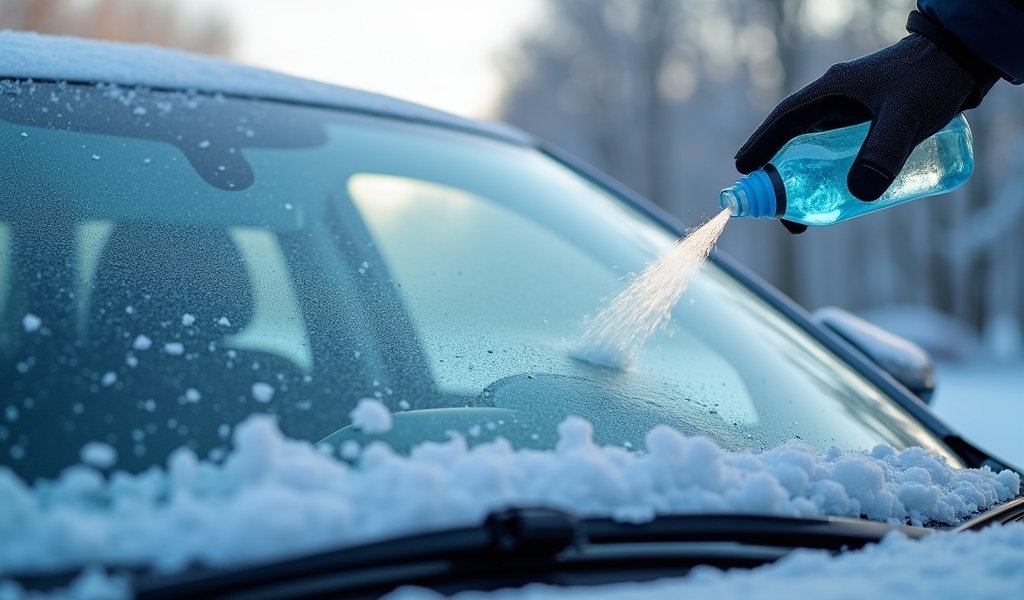Overview
This article explains why specialized winter windshield washer fluid is a critical safety component that prevents freezing and provides better cleaning power for winter road conditions, with recommendations for top commercial products rated for different temperature ranges (-20°F to -34°F) and DIY alternatives. The guide emphasizes proper application techniques, regional considerations for selecting the right formula based on local climate severity, and maintenance best practices to ensure optimal visibility during winter driving.
Table of Contents
- Why Winter Windshield Washer Fluid Matters
- Regular vs. Winter Windshield Washer Fluid: Understanding the Difference
- Top 5 Winter Windshield Washer Fluids for 2023
- Key Ingredients to Look for in Winter Washer Fluid
- DIY Winter Windshield Washer Fluid Solutions
- Application Tips and Best Practices
- Regional Considerations for Choosing Washer Fluid
- Conclusion
- Frequently Asked Questions
Why Winter Windshield Washer Fluid Matters
When temperatures drop and winter rolls in, having the best windshield washer fluid for winter isn’t just a convenience—it’s a genuine safety necessity. As someone who’s spent over 20 years under the hood, I’ve seen firsthand how regular washer fluid can freeze at just 32°F (0°C), leaving drivers with dangerously obscured visibility exactly when they need it most.
Winter brings unique challenges to your windshield: road salt, slush, ice, and that stubborn winter grime that seems to appear from nowhere. Regular washer fluid simply isn’t formulated to handle these conditions. Think of winter washer fluid as an essential part of your winter car maintenance checklist – right up there with checking your battery and swapping to winter tires.
The freezing point of your washer fluid matters tremendously. Standard summer formulas can actually expand when frozen, potentially damaging your vehicle’s washer system components. Winter-specific formulas, on the other hand, are engineered to remain liquid at temperatures as low as -20°F to -30°F (-29°C to -34°C), depending on the product.
Beyond freeze protection, winter formulas offer enhanced cleaning power to cut through winter’s unique brand of windshield filth. The salt and chemicals used on winter roads create a stubborn film that standard fluids struggle to remove. Winter formulas contain specialized detergents designed specifically for these conditions.
Regular vs. Winter Windshield Washer Fluid: Understanding the Difference
Let me clear something up that confuses many drivers: all windshield washer fluids are not created equal. The blue stuff you grab without thinking during summer months is vastly different from what should be in your reservoir come December.
Standard washer fluid typically contains water, a small amount of methanol or ethanol, detergent, and blue dye. It’s designed for mild conditions and usually freezes around 32°F (0°C) – precisely when you’ll need it most during winter. Some “all-season” formulas might protect down to about 20°F (-7°C), but that’s still inadequate for many North American winters.
Winter formulas, by contrast, contain significantly higher concentrations of freezing point depressants – typically methanol, ethanol, or propylene glycol. These ingredients dramatically lower the freezing point while also providing better cleaning power. The best windshield washer fluid for winter will prominently display its freeze protection rating on the container, typically ranging from -20°F to -30°F (-29°C to -34°C).
Another key difference is the detergent package. Winter formulas contain more robust surfactants specifically designed to cut through road salt residue, ice melt chemicals, and that mysterious winter road grime that seems to stick like glue to your windshield. Some premium winter fluids even incorporate water repellent components similar to Rain-X, helping water bead and slide off your windshield more effectively.
Cost is another consideration. Winter formulas typically cost 20-40% more than standard washer fluid, but that premium is well worth the enhanced protection and performance. When it comes to winter driving safety, this is not the place to pinch pennies.

Top 5 Winter Windshield Washer Fluids for 2023
After testing dozens of formulations over the years and gathering feedback from our service department customers, I’ve compiled this list of the best windshield washer fluid for winter conditions currently available:
1. Rain-X Winter Windshield Washer Fluid (-25°F)
This is my personal favorite and top recommendation for most drivers. Rain-X Winter formula offers excellent freeze protection to -25°F while incorporating their famous water-repelling technology. The beading effect means less fluid needed for effective cleaning, and improved visibility during snowfall.
What sets it apart: The dual-action formula both cleans effectively and leaves behind a water-repellent coating that continues working between wipes. I’ve found it particularly effective at preventing ice buildup overnight when used regularly.
2. Prestone De-Icer Windshield Washer Fluid (-34°F)
For those in the coldest regions, Prestone’s De-Icer formula offers exceptional freeze protection down to a remarkable -34°F. This is the product I recommend to customers in Minnesota, North Dakota, and similar climates with extreme winter temperatures.
What sets it apart: Contains an advanced ice-melting component that helps clear light ice from your windshield without scraping. The ethanol-based formula is also slightly less harsh on paint finishes than some methanol-heavy competitors.
3. Nextzett Kristall Klar Extreme Winter (-31°F)
This premium German formula is a favorite among European vehicle owners and enthusiasts. While more expensive than mass-market options, its concentrated formula (must be diluted) provides excellent value and exceptional cleaning performance with freeze protection to -31°F.
What sets it apart: Superior cleaning capability that leaves absolutely no streaks or residue. The concentrated format also means less packaging waste and storage space, making it environmentally friendlier than pre-mixed alternatives.
4. BlueDEF Winter Boost (-25°F)
A strong all-around performer at a reasonable price point. BlueDEF Winter Boost provides solid freeze protection while excelling at removing road salt and brine – particularly important in areas where road crews apply heavy salt treatments.
What sets it apart: Contains special surfactants specifically formulated to break down and remove calcium chloride and magnesium chloride, the most common components in road salt. Also has a pleasant, subtle scent unlike the harsh chemical smell of many competitors.
5. PEAK -20°F Winter Windshield Washer Fluid
For those in milder winter climates or on tighter budgets, PEAK’s -20°F formula offers the best value proposition. While its freeze protection isn’t as extreme as others on this list, it’s perfectly adequate for areas with moderate winter temperatures that rarely dip below -15°F.
What sets it apart: Wide availability and excellent value without sacrificing cleaning performance. The formula includes special detergents that work particularly well on bug residue – helpful during those unexpected winter warm spells that bring insects back temporarily.
Remember that the best windshield washer fluid for winter in your specific situation depends on your local climate conditions. Don’t automatically reach for the most extreme protection if you don’t need it – some of the most effective cleaning formulations actually come with moderate freeze ratings.
Key Ingredients to Look for in Winter Washer Fluid
Understanding what goes into quality winter washer fluid helps you make informed choices. Let’s pop the cap on these products and examine what makes the best windshield washer fluid for winter effective:
Methanol
The primary antifreeze agent in most winter washer fluids, methanol (methyl alcohol) effectively lowers freezing points dramatically. Higher-concentration formulas (around 30-40%) offer protection to -20°F and below. While effective, it’s important to note methanol is toxic and should be handled carefully – always wash hands after use and store away from children and pets.
According to NIOSH research on methanol safety, proper handling minimizes any health concerns while allowing us to benefit from its excellent antifreeze properties.
Ethylene Glycol vs. Propylene Glycol
Some premium formulations use glycol-based antifreeze components instead of or in addition to methanol. Propylene glycol is generally preferred as it’s less toxic than ethylene glycol (the main component in engine antifreeze). These ingredients provide excellent freeze protection while being less harsh on vehicle finishes and the environment.
Detergents and Surfactants
The cleaning power comes from specialized detergents. Winter formulations contain more robust surfactants specifically designed to break down road salt, calcium deposits, and winter road film. The best formulas contain multiple surfactant types to tackle different contaminants.
Look for products that specifically mention “salt neutralizers” or “winter contaminant removal” on their labels. These contain additional specialized cleaning agents designed for winter-specific challenges.
Water Repellents
Many premium winter formulas incorporate hydrophobic compounds that cause water to bead and roll off the glass. This technology, similar to that in dedicated rain repellent products like Rain-X, provides continued protection between wiper activations. This feature is particularly valuable during winter precipitation, improving visibility significantly.
Water repellent additives work by leaving a microscopic layer on the glass that repels moisture. The best products strike a balance between leaving enough repellent to be effective without creating smearing or visibility issues.
De-icing Agents
Some specialized winter formulations include additional chemicals specifically designed to melt light ice formation. These can help prevent ice buildup on your windshield and can even help clear a light overnight frost more quickly in the morning.
While convenient, be aware that de-icing agents typically work on very thin ice formations only – they’re not a replacement for properly scraping your windshield when necessary.
When selecting among the essential car fluids for winter, pay attention to the alcohol concentration in your washer fluid. The higher the alcohol content, the better the freeze protection but potentially harsher on paint finishes and rubber components. The best windshield washer fluid for winter strikes the right balance for your specific climate needs.
DIY Winter Windshield Washer Fluid Solutions
While commercial products offer convenience and reliability, some of my customers prefer making their own winter washer fluid. If you’re mechanically inclined and comfortable handling the ingredients safely, here are some tested DIY approaches:
Basic DIY Winter Formula
- 1 gallon distilled water (not tap water, which contains minerals)
- 1 cup isopropyl alcohol (91% concentration)
- 1 tablespoon dish soap (Dawn original works well)
This basic formula provides protection down to about 20°F (-7°C) – suitable for mild winter regions. For colder climates, you’ll need to adjust the alcohol content upward, though be aware this may affect the cleaning performance.
Enhanced DIY Formula for Colder Regions
- 1 gallon distilled water
- 2 cups isopropyl alcohol (91% concentration)
- 1 tablespoon dish soap
- 2 tablespoons of white vinegar (helps cut through road salt)
This enhanced version provides protection closer to -15°F (-26°C), making it suitable for moderate winter conditions. The vinegar addition helps neutralize and remove road salt deposits more effectively.
Important Safety Considerations for DIY Mixtures
I need to emphasize some important cautions about making your own washer fluid:
- Never use ethylene glycol antifreeze (the green or orange liquid for your radiator) in washer fluid – it damages paint and creates dangerous glare
- Prepare and store mixtures in well-ventilated areas
- Label containers clearly and keep away from children and pets
- Use only distilled water to prevent mineral buildup in your washer system
- Test a small amount on an inconspicuous area of your vehicle to ensure compatibility
DIY formulas typically don’t perform as well as commercial products when it comes to water repellency and specialized cleaning. For the absolute best windshield washer fluid for winter performance, commercial products have the advantage of specialized ingredients not readily available to consumers.
As noted by Consumer Reports testing, commercial formulations consistently outperform homemade solutions in extreme conditions, particularly in ice-melting capability and freeze protection consistency.

Application Tips and Best Practices
Having the best windshield washer fluid for winter is only half the battle. How you use and maintain your system makes a significant difference in performance. Here are my professional recommendations after two decades in the garage:
Transitioning to Winter Formula
Don’t wait until the first freeze to switch to winter fluid. Ideally, you should completely drain your summer washer fluid before adding winter formula. Here’s how I recommend doing it:
- Use a turkey baster or fluid transfer pump to remove as much fluid from the reservoir as possible
- Run your washers until they’re empty (no more fluid sprays out)
- Refill with winter formula
- Run the washers for 30 seconds to purge summer formula from lines and nozzles
This complete changeover prevents dilution of your winter formula with less freeze-resistant summer fluid, which could compromise its effectiveness.
Preventing Nozzle Freezing
Even with winter-grade fluid, spray nozzles can sometimes freeze in extreme conditions. Here are some preventative measures:
- Park your vehicle facing east when possible so morning sun hits the windshield first
- Consider aftermarket heated washer nozzles if you live in extremely cold regions
- Keep washer reservoir full – a nearly empty system is more prone to freezing
- Spray a quick burst of fluid before turning off your vehicle after driving to clear lines of excess fluid
If nozzles do freeze, don’t force them by repeatedly pressing the washer button – this can damage the pump. Instead, park in a heated garage or wait for temperatures to rise slightly.
Maximizing Winter Visibility
To get the most from your winter washer fluid:
- Replace wiper blades at the start of winter season with winter-specific blades if possible
- Clean your windshield thoroughly before the first frost to remove summer contaminants
- Apply a quality rain repellent product before winter hits for an extra layer of protection
- Consider using your washer fluid preventatively – don’t wait until visibility is already compromised
Following these essential winter car maintenance tips will ensure your visibility remains clear throughout the winter months. Remember that washer fluid is a safety system, not just a convenience feature.
Regional Considerations for Choosing Washer Fluid
The best windshield washer fluid for winter in Florida is quite different from what works in Manitoba. Your local climate should dictate your choice:
Extreme Northern Regions (Canada, Northern US)
If you regularly experience temperatures below -20°F (-29°C), invest in premium fluids rated to -30°F or lower. The extra cost is justified by the critical performance when you need it most. In these regions, consider keeping an emergency bottle in your trunk in case you run out – winter visibility is too important to compromise.
Moderate Winter Regions (Mid-Atlantic, Midwest)
For areas with temperatures typically staying above -10°F (-23°C), a good quality -20°F rated fluid provides the right balance of protection and value. Focus on products with strong cleaning formulations for road salt, as these regions often use heavy applications on roadways.
Mild Winter Regions (Southern US)
Areas with occasional freezing temperatures can often use “all-season” formulations with modest freeze protection to around 20°F (-7°C). The focus should be more on cleaning capability than extreme freeze protection.
Mountain and Variable Climate Regions
If you live in areas with dramatic temperature swings or frequently travel through mountain passes, opt for the better protection of a true winter formula even if your home base doesn’t regularly see extreme cold. Unexpected temperature drops at elevation can freeze standard fluids quickly.
Remember that manufacturers sometimes adjust formulations for regional distribution. A product labeled for -25°F protection in Texas might have a slightly different formulation than the same brand sold in Minnesota. When in doubt, go with a product explicitly marketed for your specific region.
Conclusion
Choosing the best windshield washer fluid for winter is more than a minor maintenance detail—it’s an essential safety consideration that deserves careful attention. As we’ve explored throughout this article, the right formula provides freeze protection, enhanced cleaning power for winter-specific contaminants, and potentially even water-repellent properties that improve visibility during challenging conditions.
Whether you opt for premium commercial formulations like Rain-X Winter or Prestone De-Icer, or prepare your own DIY solution, what matters most is matching your choice to your specific regional needs and ensuring proper application. Remember to completely change over your system before the first freeze, maintain your wiper blades, and treat your washer fluid as the critical safety system it truly is.
Winter driving presents enough challenges without adding poor visibility to the mix. The relatively small investment in quality winter washer fluid pays significant dividends in safety and peace of mind during those months when clear vision through your windshield matters most.
Stay safe out there, and may your windshield remain crystal clear no matter what winter throws at it!
Frequently Asked Questions
Can I mix regular and winter windshield washer fluid?
Not recommended. Mixing dilutes the winter formula’s freeze protection and can lead to system damage if freezing occurs.
When should I switch to winter washer fluid?
Make the switch before the first freezing temperatures hit your area, typically in late fall. It’s better to be proactive than reactive.
Will winter windshield washer fluid damage my car’s paint?
Quality winter fluids are formulated to be safe for automotive finishes. However, due to higher alcohol content, don’t let it sit on paint surfaces for extended periods.
What’s the difference between blue and orange winter washer fluids?
The color is primarily for identification and has no bearing on performance. Always check the temperature rating rather than judging by color.
Is it worth paying more for premium winter washer fluid?
For very cold climates or if you value additional features like water repellency, yes. For moderate winters, mid-range products often provide sufficient protection.

